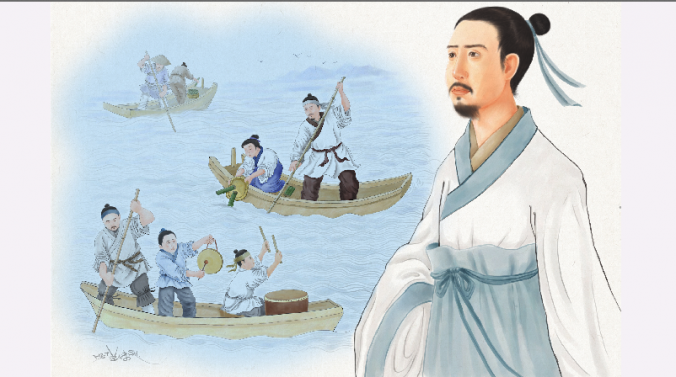
A painting commemorating the death of Qu Yuan
China’s Dragon Boat Festival came immediately the day after the U.S.’ own Memorial Day this year. Certainly, both these dates are occasions to reflect on the meaning of patriotism for both China and the U.S., respectively.
However, the Dragon Boat Festival’s origin combined with the recent passing of Zbigniew Brzezinski only serve to highlight the larger lesson of placing a state’s long-term strategic vision over incessant political infighting.
Today’s Dragon Boat Festival in China is said to commemorate the life and (especially) the death of Qu Yuan. Qu was a statesman and poet exemplar in the employ of the Kingdom of Chu during China’s Warring States Period. Reportedly, many of Qu’s fellow ministers at the Royal Court were jealous of his intellectual brilliance and subsequently slandered him. This led to his first exile by his king.
Luckily, Qu was eventually recalled from this initial exile to restart negotiations between Chu and fellow state Qi. These negotiations were seen as critical to Chu’s survival.
Unfortunately for Qu, he was soon after sent into his second and final exile due to incessant slandering on the part of Chu’s Prime Minister. During this time of reflection, Qu returned to his hometown and penned many of his now legendary poetic works, some specifically addressing Chu’s many problems. During this time, Qu learned of the capture of Chu’s capital by yet another rival state, Qin. Upon hearing of this, Qu reportedly waded into a river holding a heavy rock, thereby committing suicide.
According to legend, many of the villagers tried to save him by racing toward him in dragon boats. However, they were too late and it is said that Qu’s spirit told them to offer rice to the river’s fish to keep them away from his remains.
This story is quite old and many details of it are sketchy simply due to it taking place in antiquity. In Western lore, a rough analogy might be Socrates’ taking of hemlock. However, what is not in dispute is that the story has had quite an impact on many Chinese throughout the ages as to the true meaning of patriotism and self-sacrifice.
While the names of the states of Chu, Qi, and Qin may seem irrelevant and arcane to some, they are quite germane to geopolitics as it relates to relations between the U.S., China, and Russia today.
To this end, the world recently saw the untimely death of Zbigniew Brzezinski, former scholar and National Security Advisor to President Jimmy Carter. In essence, Brzezinski was not only able to adroitly grasp the growing rift in Sino-Russian relations during the Cold War, but also was successful in advising his king on how to exploit this situation.
Building upon the foundation which President Richard Nixon and his own National Security Advisor Henry Kissinger’s 1972 Beijing visit represented, Brzezinski articulated the necessity to Carter of strengthening U.S.-China ties based on shared interests (not values) in weakening the Former Soviet Union’s global position. This, in turn, led to the Soviet invasion of Afghanistan, the Soviets’ eventual withdrawal from the country and, arguably, the eventual dissolution of the Former Soviet Union itself, leaving the U.S. as the world’s sole superpower.
This story is not over, however, because the story of geopolitics itself is never truly over as the world never stops spinning. The U.S.’ brief moment of unipolarity following the end of the Cold War is now over as the country is in relative decline as other centers of power emerge (or re-emerge in the case of China) around the world. This has led, of course, to many differing points of view within the U.S. foreign policy establishment regarding the best way to relate to China (engagement vs. containment vs. “congagement”, etc.).
Sadly, slandering and associated partisanship is by no means a strictly ancient phenomenon relegated to the time of Qu Yuan. Today’s multipolar world and the quickening pace of globalization mirror both China’s Warring States and Japan’s own Sengoku Jidai periods. While many within Washington are still trying to decide if the Cold War with Russia is actually over, other states like China are moving forward with massive new initiatives like “One Belt, One Road“.
The mere perception of possible and actual U.S. withdrawal from global commitments (NATO, TPP, climate change and arms control treaties, etc.) without an overarching vision of how the U.S. intends to realize its foreign policy strategic goals have left allies, partners, and adversaries alike all reeling. This lack of strategic focus now, combined with interminable, unproductive, and scandalous accusations within Washington itself, has the potential in the long-term to leave the U.S. at the mercy of an even more unforgiving and vicious world in the future.